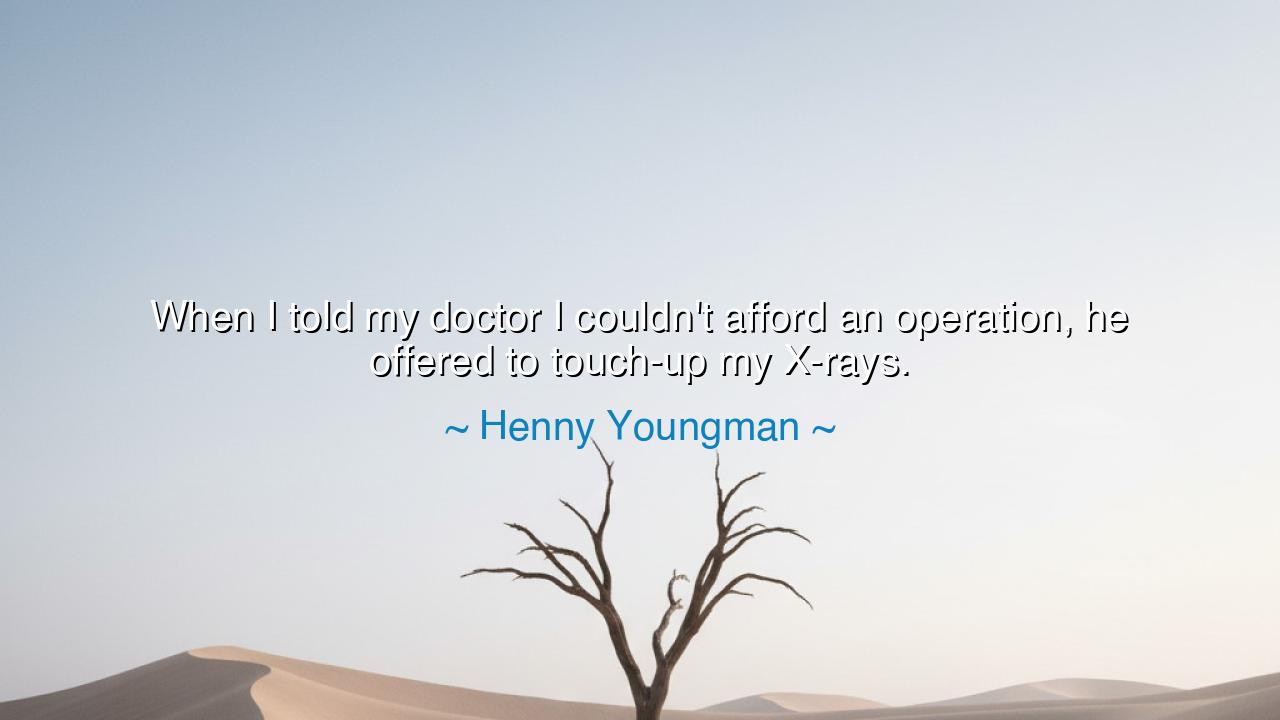
When I told my doctor I couldn't afford an operation, he offered
When I told my doctor I couldn't afford an operation, he offered to touch-up my X-rays.






"When I told my doctor I couldn't afford an operation, he offered to touch-up my X-rays." These words from Henny Youngman, a master of wit and humor, carry a sharp critique of the healthcare system and the absurdities that often accompany it. In his classic deadpan style, Youngman presents a comical but sobering observation about the lengths to which some will go when confronted with the realities of costly medical care. The line exposes the dehumanizing paradox in the system, where, for many, the difference between life and death may be as simple as the inability to pay for essential treatments. It is a reminder that in the pursuit of health, the cost can often seem more burdensome than the ailment itself, and the very institutions designed to heal may sometimes appear more focused on profit than on care.
In the ancient world, medicine was often considered a sacred calling, yet even in those times, healers faced tensions between their duty to the sick and the societal structures that governed their practices. Hippocrates, often called the "father of medicine," laid down the Hippocratic Oath, which emphasized that a physician’s duty was to serve their patients with integrity, not driven by financial gain. However, in practice, even in ancient Greece, the profession of healing was often bound by economic realities. The Greeks understood the importance of medical care, yet those who could not afford treatment were left to suffer or find alternative means, much like the citizens of today’s healthcare systems. Youngman’s joke, though delivered with humor, touches on the same frustration with an inequitable healthcare system that has been present for millennia.
Similarly, in the Roman Empire, medicine was intertwined with status and wealth. Wealthy Romans had access to elite doctors and specialized treatments, while the poor had to rely on herbal remedies or the services of less formal healers. A similar divide in access to healthcare is seen today, as Henny Youngman’s joke highlights the modern equivalent of that ancient inequality. The Hellenistic period saw a growing divide between the rich and poor in terms of medical care, and while Rome’s public health systems attempted to address the needs of the masses, there was always a deep economic divide that determined the quality and accessibility of care. The joke about "touching up X-rays" reflects the same struggle that both the ancient and modern world face: how to deliver true care to all people, regardless of their economic situation.
In the modern world, this dilemma is only exacerbated. The United States, often lauded for its medical advancements, has one of the highest healthcare costs in the world. Many people face the heart-wrenching decision of choosing between their health and their financial well-being. This irony is present in the joke: the doctor—a figure of authority and care—offers a mock solution rather than addressing the real problem of affordability. Youngman’s words ring with dark humor because they shed light on the profound injustice that too many individuals face: the lack of access to necessary medical treatments because of the costs involved.
The lesson in Youngman’s quote is that, while humor may mask the pain of a system gone awry, there is deep wisdom in recognizing the absurdities and injustices that pervade our institutions. Healthcare should not be a luxury for the wealthy but a basic human right—a value held in the hearts of many, from ancient civilizations to modern societies. In every era, those who suffer from illness have looked to their leaders and healers for relief, yet too often, the moral duty to care is obscured by economic barriers. Youngman uses humor as a lens through which we can critically examine the failure of our systems to provide for those in need.
In our own lives, we must advocate for a more equitable healthcare system, where the financial barriers to treatment are minimized. Just as the ancients sought to create systems where health was a shared responsibility, we must push for policies and systems that prioritize people over profit. While humor like Youngman’s brings light to difficult subjects, it also underscores the seriousness of the underlying issue. We must strive to build societies that ensure access to healthcare is not determined by wealth, but by need. The modern world can—and must—do better.
Lastly, Youngman’s joke offers a reminder that humor can be a powerful tool in shining a light on serious problems. Though his words were delivered with irony, they carry a profound truth: the economic divide in healthcare is a real and pressing issue that impacts millions. In our personal journeys, we can follow Henny Youngman’s lead by using humor and critique as methods to bring attention to social injustices. But we must also act—demanding better systems, advocating for those who are voiceless, and ensuring that the most vulnerable are not left to suffer in silence. Change is always possible, and it begins with both recognizing the flaws and acting boldly to correct them.






AAdministratorAdministrator
Welcome, honored guests. Please leave a comment, we will respond soon